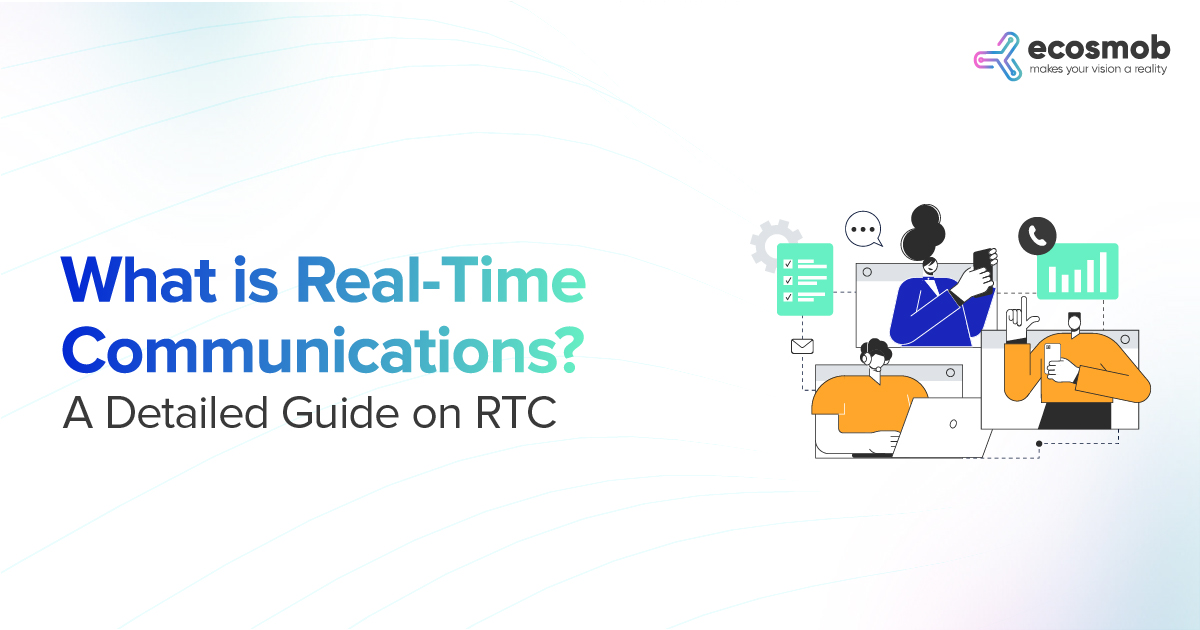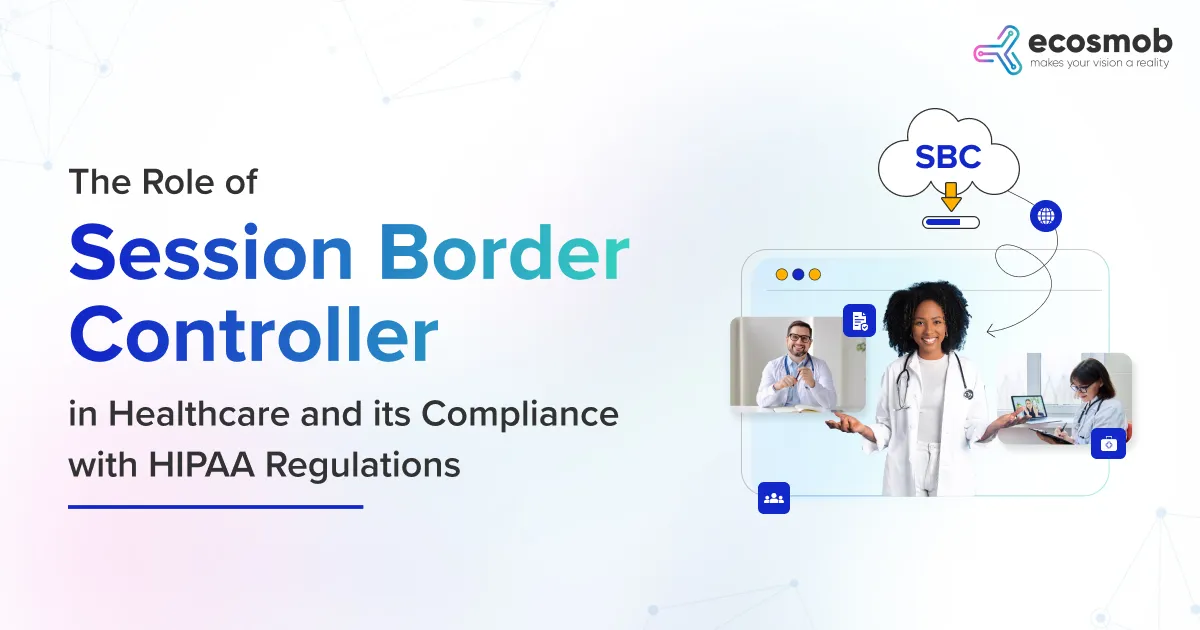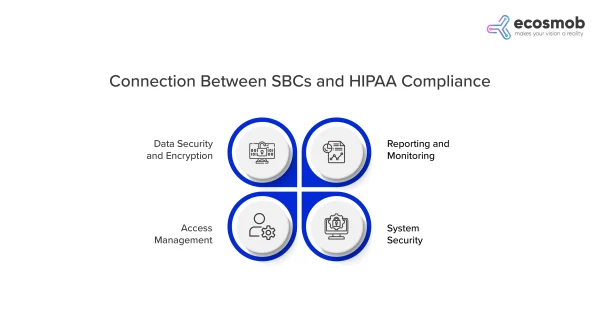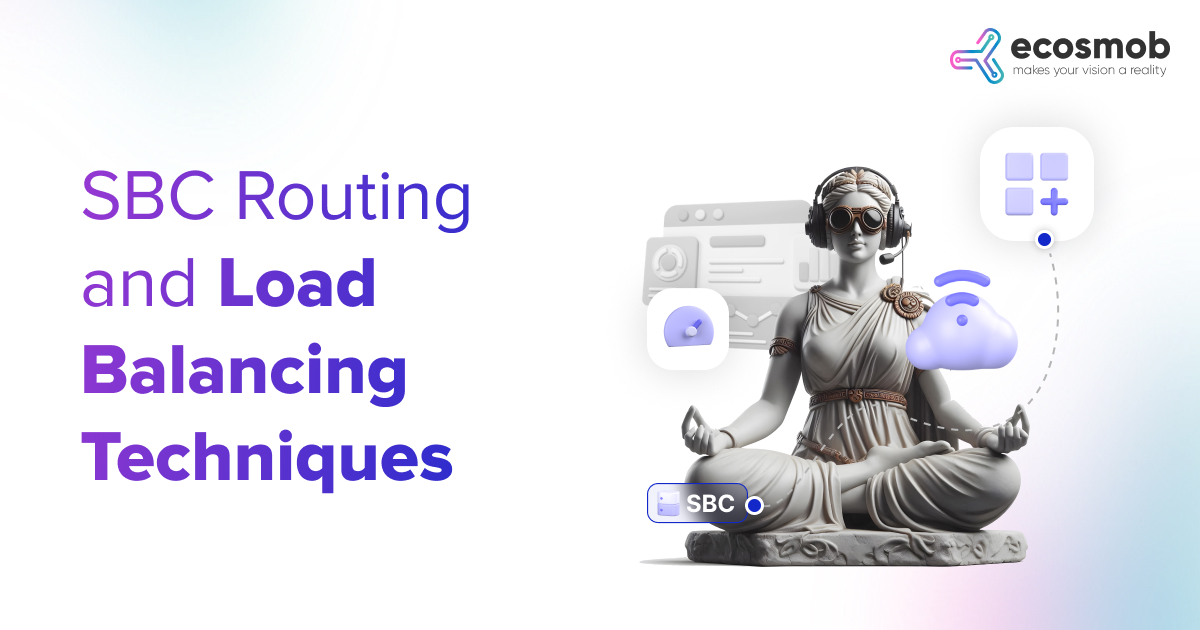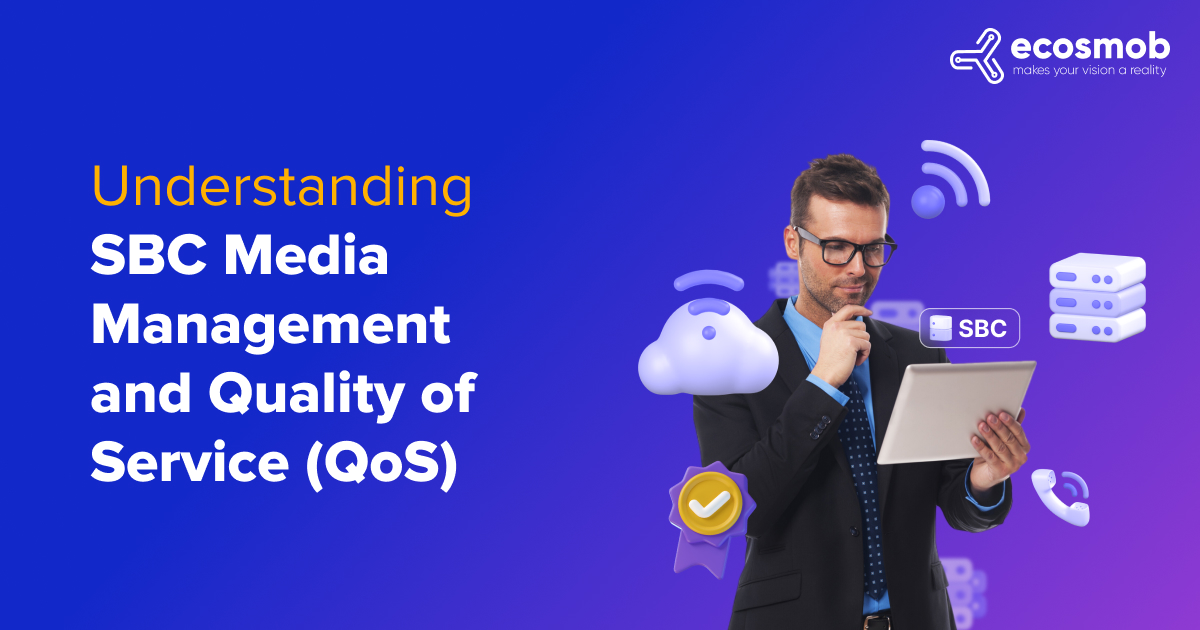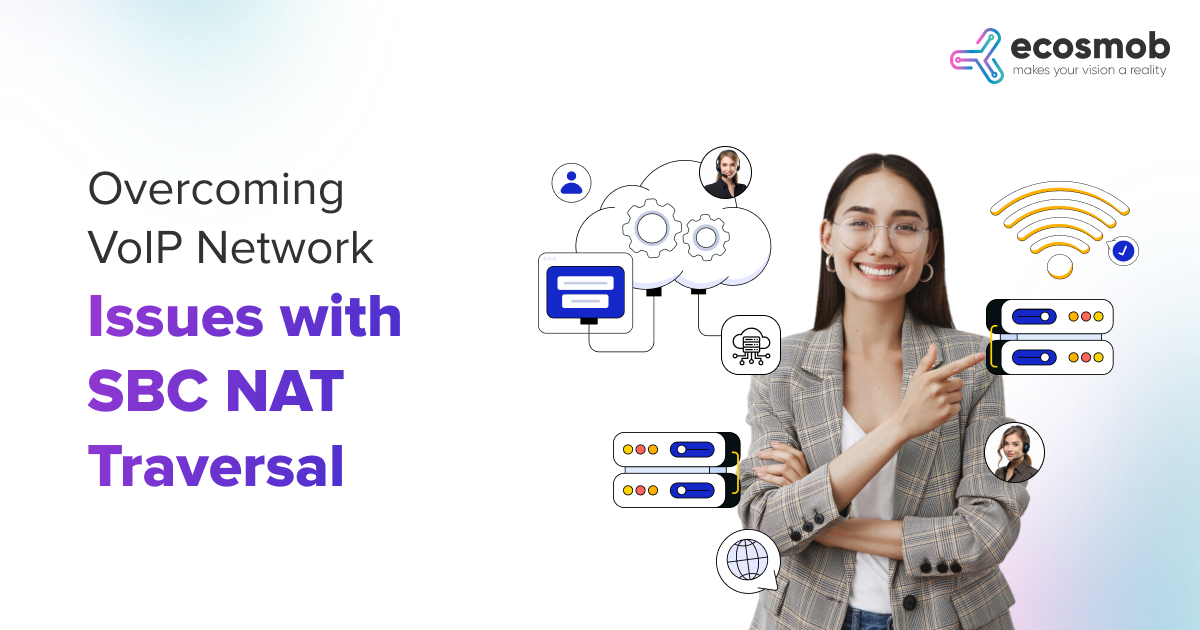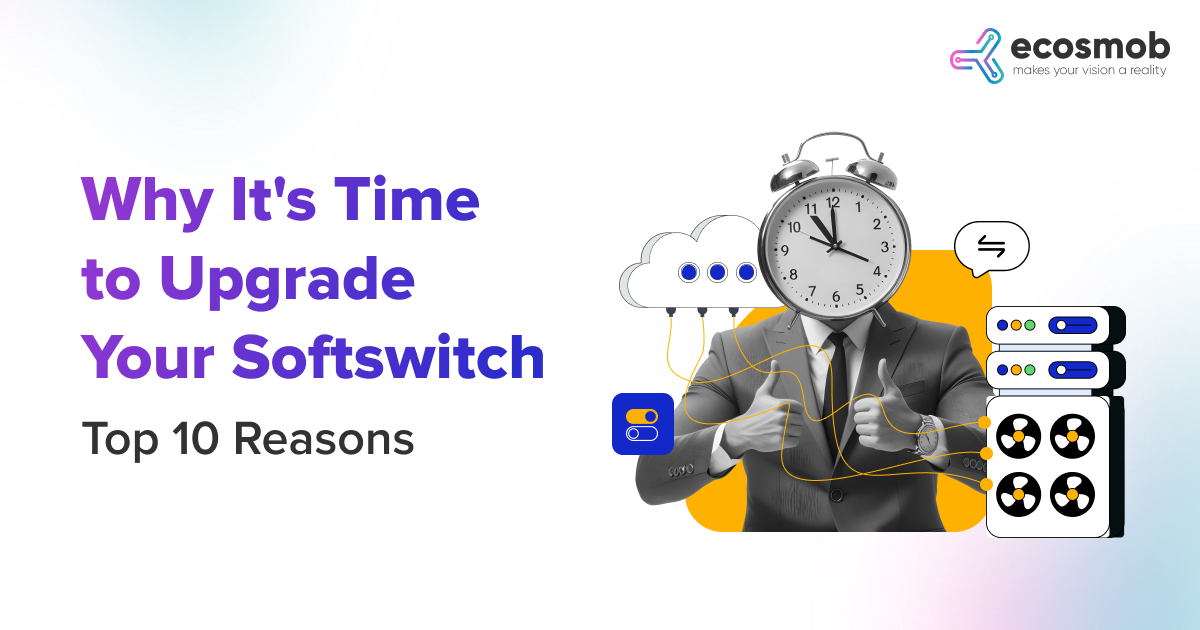Due to the increasing importance of data in this digital realm, security standards have become increasingly crucial. The center of this digital transformation has formed in the Healthcare industry, which houses sensitive patient data. Session Border Controllers (SBCs) have grown indispensable in strengthening security frameworks and guaranteeing adherence to HIPAA standards in the middle of this. Using SBC solutions is a technological advancement and a step towards strengthening the healthcare data infrastructure. In this article, Ecosmob dives in and explores the use of SBCs in Healthcare, how they are implemented, and how they might be adjusted to follow strict HIPAA regulations.
According to Databridgemarketresearch, the market for global enterprise session border controllers had a value of USD 417.80 million in 2021 and is projected to grow to USD 989.08 million by 2029, at a CAGR of 9.00% from 2022 to 2029.
Introducing SBCs in Healthcare with a Secure Voice
The sentinels of the secure communication in the Healthcare ecosystem are session border controllers. They control real-time information flow between networks, preserving the confidentiality and security of the data being sent. Deploying SBCs is essential to achieving and maintaining HIPAA compliance since Healthcare information is sensitive.
Also Read: Telepresence Solution in Healthcare Industries
Optimizing Healthcare Communication Networks using SBC Solutions
SBCs in the Healthcare industry direct a smooth, secure flow of information by serving as guards at the entrance to communication networks. They provide secure real-time communications, protect the internal networks from potential external attacks, and guarantee the confidentiality and integrity of shared data. The importance of secure communication networks has increased dramatically with the rise of telemedicine and remote patient monitoring, making SBCs an essential part of the infrastructure for contemporary Healthcare.
Connection Between SBCs and HIPAA Compliance
SBC solution implementation is a step toward HIPAA compliance. Thanks to their strong data encryption, access control, and network security features, SBCs are the perfect barrier against data breaches and illegal access to critical patient information.
Don’t let cyber threats compromise your patient's data. Get in Touch with Us!
Data Security and Encryption
SBCs are essential to the encryption of data both in transit and at rest. They follow HIPAA’s encryption rules using powerful encryption methods to ensure the data is impenetrable to unauthorized access.
Access Management
SBCs ensure that only authorized personnel access sensitive information by defining and enforcing access controls. It is crucial to adhere to HIPAA’s access control requirements.
Reporting and Monitoring
HIPAA compliance requires monitoring patients’ data and ensuring reports are monitored and provided securely.
System Security
A secure communication network, essential for HIPAA compliance, is ensured by SBCs, skilled in spotting and countering possible threats.
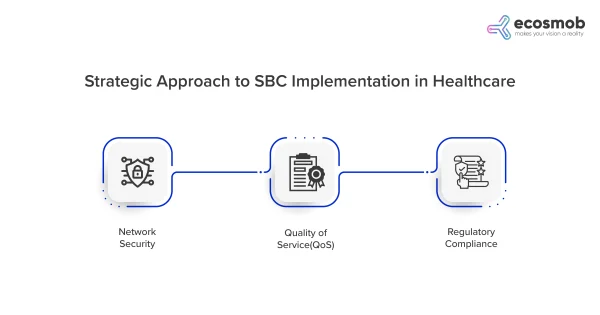
Strategic Approach to SBC Implementation in Healthcare
SBC implementation in the Healthcare setting is a calculated move meant to streamline communication and consolidate security. SBC voice and video conferencing in healthcare, instant messaging, and other forms of real-time communication are essential to today’s Healthcare operations. SBCs assist in managing and monitoring these types of communications. Furthermore, as telemedicine has spread widely, the significance of SBCs has grown even more.
Network Security
SBCs serve as a firewall for VoIP traffic, defending the network from potential threats, including Denial of Service (DoS) assaults. Additionally, they guarantee that only approved traffic is permitted, lowering the possibility of data breaches.
Quality of Service(QoS)
For QoS, SBCs in Healthcare activities make sure that real-time communications are prioritized.
Regulatory Compliance
SBCs are essential for adhering to HIPAA regulations since they secure the communication infrastructure.
Challenges Adhering to Stringent rules like HIPAA
Healthcare practitioners encounter difficulties upholding strict laws like HIPAA while ensuring effective communication. The following examples show these difficulties:
Security and Accessibility Must be Balanced
Healthcare professionals are expected to maintain high security to safeguard private patient data. However, this security can occasionally be a barrier to effective communication with partners or clients outside the company. It can be challenging to balance strong security and simple accessibility.
Technical Restrictions
Small and Medium-sized Companies (SMCs) in Healthcare firms may need to invest in new technologies because outdated communication methods could not be HIPAA-compliant. It cannot be easy to integrate various technologies while preserving smooth communication.
Interoperability
Healthcare practitioners frequently need to communicate with various organizations, including healthcare specialists, pharmacies, insurance firms, and other SBC solution providers for Healthcare. A significant technological and administrative problem is ensuring smooth interoperability while adhering to HIPAA.
Pricing Implication
Performing ongoing compliance monitoring, training people, and modernizing communication technologies can cost a lot of money. This expense might be a barrier, particularly for smaller Healthcare providers.
Ongoing Efforts to Secure SBC Usage in Healthcare
Secure SBC usage in Healthcare requires ongoing work rather than a one-time effort. To ensure that the SBC solutions continue to be effective in a sensitive environment that is constantly changing, it requires continuous upgrades, monitoring, and maintenance.
Maintaining the HIPAA compliance of SBC
Let’s regularly maintain the SBC infrastructure to conform with HIPPA. Here are some significant steps to make sure about HIPAA compliance when implementing SBCs:
Patches and Updates
Apply the most recent security updates for the SBCs to maintain a robust security posture.
Recurring audits
Regular audits are mainly to ensure the SBC infrastructure complies with HIPAA rules.
Training
Ensuring that the staff members in charge of the SBCs are adequately trained and knowledgeable about the most recent compliance regulations is crucial.
Choosing the Best SBC Healthcare Providers
You must carefully consider your options before choosing your SBC provider for Healthcare. Ecosmob Technologies can be your preferred partner for all your real-time communication requirements. Our experts are thoroughly aware of the Healthcare industry’s regulatory environment and the technological ability to provide a solution tailored specifically to your Healthcare company’s requirements. We provide:
Customization
It is essential to have the capacity to customize the SBC solution to your unique requirements.
Assistance
For the SBC solution to remain valuable, ongoing support and SBC maintenance for HIPAA are essential.
Expertise
SBC providers for Healthcare with a track record can better manage the complex regulatory environment.
Final Thoughts
SBC implementation in the Healthcare industry and HIPAA compliance go hand in hand. By providing a solid security architecture, SBCs enable Healthcare practitioners to securely use intricate digital communication channels. The cornerstones of long-term observation and secure Healthcare communication for HIPAA are the selection of skilled SBC providers for Healthcare and an uncompromising dedication to SBC upkeep. Implementing and maintaining SBCs in their infrastructure gives Healthcare providers a firm basis to safeguard sensitive data and ensure the privacy and safety of patient information. At the same time, they continue to struggle with many issues faced by HIPAA compliance. However, if you are the one wondering about SBC Implementation in Healthcare, feel free to get in touch with Ecosmob Technologies. Our professionals are highly skilled and offer you on-time assistance.
FAQs
1. What role do SBCs play in applying HIPAA rules in healthcare settings?
By offering a secure communication gateway, SBCs support HIPAA compliance. They help protect against illegal access, encrypting and authenticating data transmissions, and guaranteeing that healthcare businesses adhere to HIPAA security requirements.
2. What crucial SBC solution characteristics make them appropriate for healthcare settings?
SBC solutions for the healthcare industry frequently feature robust authentication procedures, access control techniques, and session border control. These characteristics work together to build a secure communication infrastructure for healthcare systems.
3. Can SBCs be modified to suit the unique security requirements of various healthcare organizations?
Yes, trustworthy SBC suppliers frequently provide customization choices to fulfill the particular security requirements of healthcare businesses. It could entail adjusting encryption protocols, access control rules, and other security measures to fit each healthcare entity’s needs and infrastructure.
4. How do SBCs support safe remote patient monitoring and telemedicine while following HIPAA rules?
By setting up secure communication channels, SBCs are essential for enabling remote patient monitoring and secure telemedicine. It guarantees the confidential and HIPAA-compliant transmission of sensitive health information during remote monitoring or virtual consultations.
5. What upkeep procedures should be implemented to guarantee continued HIPAA compliance with SBCs in the healthcare industry?
Maintaining SBC HIPAA compliance requires frequent maintenance. It entails regularly performing security audits, updating firmware and software, monitoring logs for security incidents, and resolving any vulnerabilities or problems as soon as they appear.
